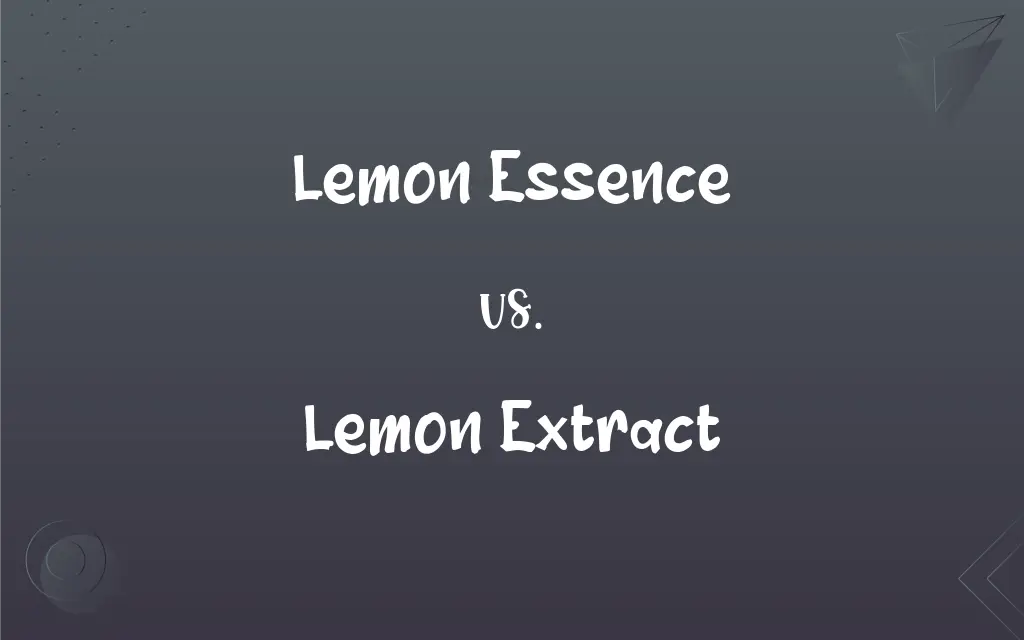Lemon Essence vs. Lemon Extract: What's the Difference?
Edited by Janet White || By Harlon Moss || Updated on June 7, 2024
Lemon Essence is a synthetic flavoring, while Lemon Extract is derived from natural lemon peels. Both add lemon flavor, but their origins and intensities differ.

Key Differences
Lemon Essence and Lemon Extract both serve to introduce a lemony flavor to culinary dishes and baked goods. However, the way they are produced and their flavor profiles set them distinctly apart. Lemon Essence, for starters, is generally a synthetic or artificially created flavoring. It's designed to mimic the taste of lemon without being sourced from the actual fruit, making it a more cost-effective option in many cases. Lemon Extract, in contrast, is made by soaking lemon peel in alcohol, resulting in a natural and intense flavor. Due to its natural origins, many culinary experts and enthusiasts prefer Lemon Extract for its authentic taste and aroma.
It's also worth noting the concentration levels of both. Lemon Essence, being synthetic, can sometimes have a more consistent but less complex flavor profile. This makes it easier to control in terms of flavor but may not deliver the depth that some recipes demand. Lemon Extract, being a more concentrated form of lemon flavor derived directly from the fruit, tends to offer a richer and more profound lemon taste.
When deciding between Lemon Essence and Lemon Extract, the choice often boils down to personal preference, the demands of the specific recipe, and considerations of cost and availability. Some may prefer the straightforward and consistent flavor of Lemon Essence, while others might lean towards the natural depth and richness of Lemon Extract.
Comparison Chart
Origin
Synthetic or artificially created
Natural; made from lemon peels
Flavor Intensity
Consistent but less complex
Rich and profound
ADVERTISEMENT
Production Method
Chemical formulation
Soaking lemon peels in alcohol
Preferred by
Those seeking cost-effective, consistent flavor
Culinary experts for authentic flavor
Usual Application
Baking and cooking where depth isn't critical
Recipes demanding authentic lemon flavor
Lemon Essence and Lemon Extract Definitions
Lemon Essence
Consistent and straightforward in its flavor profile.
For a uniform flavor, she chose Lemon Essence.
Lemon Extract
Contains the true essence of lemon fruit.
The Lemon Extract gave the dish an unmistakable lemon punch.
ADVERTISEMENT
Lemon Essence
Popular in commercial food preparations.
Many commercial candies use Lemon Essence for flavor.
Lemon Extract
Delivers a deeper and more nuanced lemony hint.
For a layered lemony experience, Lemon Extract is the choice.
Lemon Essence
A cost-effective alternative to natural flavors.
She opted for Lemon Essence due to budget constraints.
Lemon Extract
A concentrated flavor derived from lemon peels.
The pie required a teaspoon of Lemon Extract for a rich taste.
Lemon Essence
A synthetic lemon flavoring agent.
She added a drop of Lemon Essence to the cake batter.
Lemon Extract
Preferred for genuine and natural lemon flavor.
Culinary experts often choose Lemon Extract over artificial flavorings.
Lemon Essence
Mimics lemon flavor without natural extracts.
Lemon Essence provided a quick lemony touch to the cookies.
Lemon Extract
Produced by soaking lemon in alcohol.
Authentic Lemon Extract captures the true lemon aroma.
FAQs
What is the primary difference between Lemon Essence and Lemon Extract?
Lemon Essence is synthetic, while Lemon Extract is natural.
Which one has a richer flavor?
Lemon Extract, due to its natural derivation.
Is Lemon Essence cheaper than Lemon Extract?
Typically, yes, since it's synthetically produced.
Does Lemon Essence contain any natural lemon?
Generally, no, it's a synthetic flavoring.
Can I make Lemon Extract at home?
Yes, by soaking lemon peels in alcohol.
Is Lemon Essence suitable for vegan recipes?
Generally, yes, but always check the label for ingredients.
Can they be used interchangeably in recipes?
While possible, the flavor intensity and profile may vary.
Which is more commonly found in commercial products?
Lemon Essence, due to its cost-effectiveness and consistency.
Which one is preferred in gourmet cooking?
Lemon Extract for its authentic flavor.
How can I tell if my recipe requires Lemon Essence or Extract?
Check the ingredient list and note the emphasis on natural or synthetic flavoring.
How is Lemon Extract made?
By soaking lemon peels in alcohol.
Can using too much Lemon Extract make a dish bitter?
Yes, since it's concentrated and derived from peels.
Are there natural variants of Lemon Essence?
Some might contain natural flavors but are still enhanced artificially.
Do both have the same aroma?
No, Lemon Extract usually has a more authentic aroma.
Does Lemon Essence have a longer shelf life?
Typically, being synthetic, it might last longer than natural extracts.
Is Lemon Essence always the same across brands?
While consistent, there might be slight variations between brands.
How should Lemon Extract be stored?
In a cool, dark place to preserve its flavor.
Which one is more potent?
Lemon Extract, due to its concentrated nature.
Is there alcohol in Lemon Essence?
Not usually, but always check the label for ingredients.
Are there health concerns related to Lemon Essence?
While generally safe, some might react to synthetic flavorings.
About Author
Written by
Harlon MossHarlon is a seasoned quality moderator and accomplished content writer for Difference Wiki. An alumnus of the prestigious University of California, he earned his degree in Computer Science. Leveraging his academic background, Harlon brings a meticulous and informed perspective to his work, ensuring content accuracy and excellence.
Edited by
Janet WhiteJanet White has been an esteemed writer and blogger for Difference Wiki. Holding a Master's degree in Science and Medical Journalism from the prestigious Boston University, she has consistently demonstrated her expertise and passion for her field. When she's not immersed in her work, Janet relishes her time exercising, delving into a good book, and cherishing moments with friends and family.































































